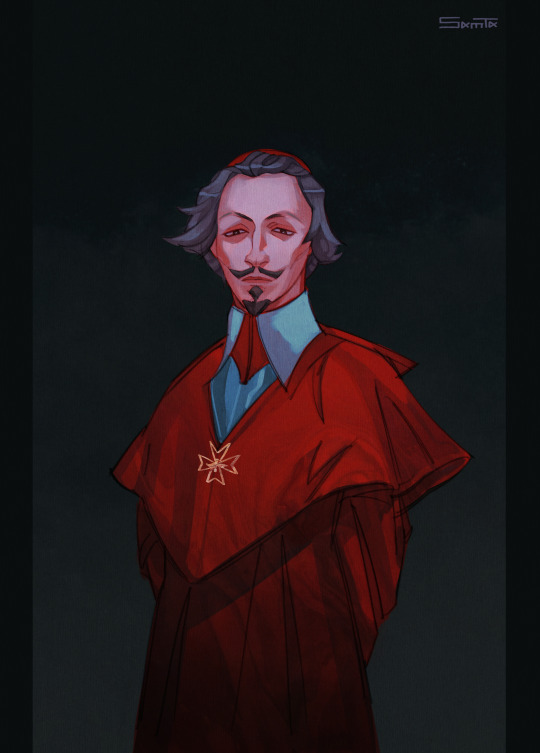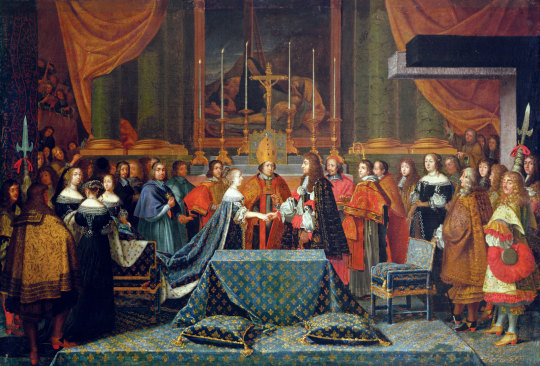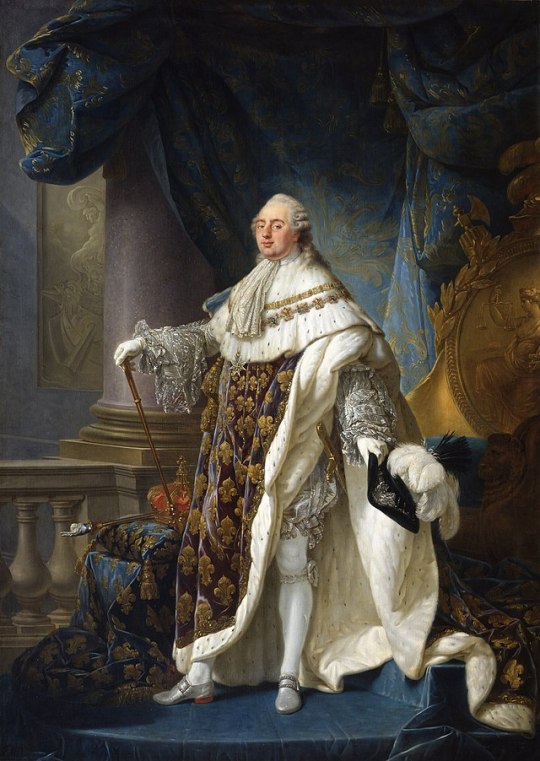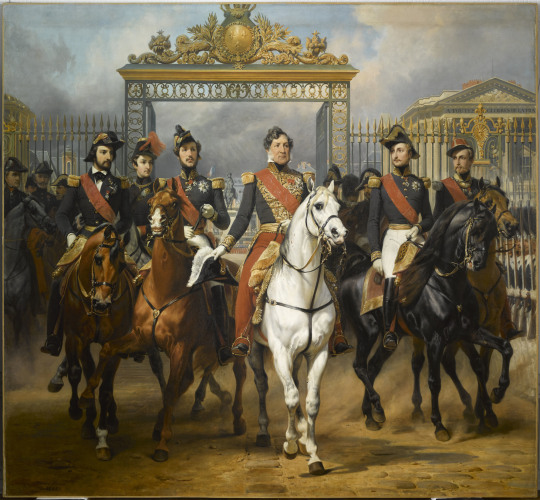#French monarchy
Explore tagged Tumblr posts
Text

#Richelieu#cardinal richelieu#digital art#fanart#digital painting#artists on tumblr#digital illustration#illustration#my art#the three musketeers#history fanart#louis xiii#french history#french monarchy
177 notes
·
View notes
Text


On this day in history, August 2nd, in 1830, Marie Therese Charlotte, the daughter of Louis XVI and Marie Antoinette, may have briefly been Queen of France.
Charles X abdicated the throne in favour of his son, Louis Antoine, who was Marie Therese’s husband. In the twenty minutes between the time Charles reluctantly abdicated, and the time his son equally reluctantly did the same in favour of his young nephew, they could be considered King and Queen of France.
There is some debate if they were technically King and Queen, as the abdication document with his and his fathers' signatures was released at the same time, and he's only referred to by his given name of Louis Antoine and as the Dauphin. His "reign" such as it was, if one considers it legitimate, would be the shortest reign in recorded history.
#marie therese charlotte#madame royale#duchesse d'angouleme#louis antoine d'artois#duc d'angouleme#louis xix#long live the queue#french monarchy#french royal family#bourbon restoration
71 notes
·
View notes
Text

Marriage of Louis XIV and Maria Theresa of Austria, 9th June 1660
Artist: Jacques Laumosnier (French, c. 1669 - c. 1744)
Date: 17th century
Medium: Oil on canvas
Collection: Tessé Museum, Le Mans, France
#painting#ceremony#marriage#wedding#oil on canvas#fine art#genre art#louis iv#maria theresa of austria#french monarchy#french empire#interior scene#costume#king of france#table#chair#textiles#men#women#pillows#drapery#candlesticks#candles#french history#jacques laumosnier#french painter#french culture#17th century painting#artwork#european art
25 notes
·
View notes
Note
The french monarchy (from the 1780s)
behead, behead, or behead

21 notes
·
View notes
Text
La Fayette and the Monarchy – a Summary
La Fayette’s relationship with the Monarchy, both in France and elsewhere in Europe, was often a rather strained one. While he was not opposed to the institution of the monarchy as such, he often found himself at odds with the ruling families. But regardless of the times and the relationship then existing between La Fayette and Europe’s crowned heads – there was almost always also a certain comedic or even ironical element to it.
So here is a little list of some of La Fayette “best moments”:
La Fayette insulted the future Louis XVIII (and angered his father-in-law in the process)
La Fayette on the future William IV (aka the “Royal Little Tar”)
La Fayette trying to apologize to Louis XVI after going against his direct orders not to sail to America
La Fayette at a dinner party with Lord Cornwallis, Frederick, Duke of York and Frederick the Great
La Fayette featured in rather explicit prints with Marie Antoinette
Queen Charlotte’s approval of La Fayette’s imprisonment
La Fayette’s descendant currently sits on the Belgian Throne
… to be continued
#marquis de lafayette#la fayette#french history#american history#american revolution#french revolution#marie antoinette#louis xvi#louis xviii#lord charles cornwallis#frederick duke of york#frederick the great#history#french monarchy#belgium monarchy#british royal family
63 notes
·
View notes
Text

You didn't deserve this cruel world . 🥲
3 notes
·
View notes
Text
A tribute to my dearest Marie Antoinette 💖
#forgot to post this when it actually was 16th of october lmfao#marie antoinette#french revolution#1790s#marie antoniette 2006#my edit#viva la vida#coldplay#french monarchy#queen of france#habsburg#house of bourbon#tumblr fyp
24 notes
·
View notes
Text

Token of Louis XVII, titular King of France and Navarre (1793-1795)
5 notes
·
View notes
Text
“Only fools, pure theorists, or apprentices fail to take public opinion into account.”

Jacques Necker was a Genevan banker and statesman who served as finance minister for Louis XVI. He was a reformer, but his innovations sometimes caused great discontent.
Born: 30 September 1732, Geneva, Switzerland
Died: 9 April 1804, Geneva, Switzerland
Swiss Origins: Necker was born in Geneva, Switzerland, in 1732. His Swiss background made him a foreigner in the French political landscape, and this sometimes influenced the perception of his policies.
Self-Financed Publication: Necker was known for his publication titled "Compte Rendu," or "Report on the Finances." This document, which detailed the state of France's finances, was unique in that Necker personally financed its publication. This move aimed to showcase transparency and gain public support.
Resignation through Illness: In 1781, Necker resigned from his position as Finance Minister, citing health reasons. His resignation was accepted, but he continued to influence French politics from behind the scenes. He was later recalled to office in 1788.
Criticized by Revolutionaries: Despite being initially celebrated for his efforts to improve financial transparency, Necker faced criticism from revolutionary figures like Maximilien Robespierre. They accused him of being too sympathetic to the monarchy and not fully supporting the revolutionary cause.
Exile in Switzerland: After the fall of the Bastille in 1789 and the escalation of the French Revolution, Necker resigned once again. Fearing for his safety, he sought refuge in Switzerland. His departure marked the end of his active political career.
#Jacques Necker#French Revolution#Finance Minister#Louis XVI#Economic Reforms#Enlightenment#Transparency in Government#Swiss Banker#Statesman#Political Reform#Public Finances#1789 Crisis#National Assembly#Royal Finances#Dismissal from Office#Necker Reports#French Monarchy#Social Unrest#Financial Management#Legacy of Jacques Necker#quoteoftheday#today on tumblr
1 note
·
View note
Text
Highlights from the divorce trial of Louis XII
In 1498, King of France Louis XII launched a trial against his wife so he could divorce her, and secure a much more valuable marriage with Anne, duchess of Brittany. Divorce trials for Kings were settled by the Papacy, and, thankfully for Louis, he had just allied himself with the current Pope, Alexander VI Borgia...
Some highlights:
- 27 witnesses testified for the King, and only 3 - selected by the King himself - for his wife Jeanne.
- The King's prosecutor tried to prove Louis and Jeanne's union was incestuous, because Jeanne's father was Louis' godfather, making Louis and Jeanne spiritual siblings.
- The King's men tried to convince the judges that Jeanne's father, Louis XI, forces Louis to marry his daughter, rendering the marriage illegal. To prove this point, a witness testified that the tyrannical Louis XI terrified "not only the men of his kingdom, but also the trees" (??)
- To further emphasize that this marriage was forced upon Louis, the prosecutor insisted on Jeanne's ugliness. He explained that when Louis' mother met Jeanne for the first time, she was so taken aback that she fainted on the spot.
- Unfortunately for Louis, canonical law didn't recognize ugliness as a valid cause for divorce (only as a valid reason to break off a betrothal)
- Witnesses claimed Louis XI had hated Louis since he was a baby, because when baby Louis was being baptized, he pissed on the King's hand, which the superstitious Louis XI interpreted as a sign of a inherent rebellious nature
Louis XII DID manage to divorce his wife. Something French Kings had often tried to do, rarely with success. Not a great win for fair and ethical trials though...
2 notes
·
View notes
Text

Chibi Colbert
#had to repost it for some reason#art#digital art#digital painting#my art#artwork#illustration#artists on tumblr#art sketch#digital artwork#sketch#Jean Baptiste Colbert#history fanart#history art#french history#baroque#french monarchy#louis xiv#chibi art
50 notes
·
View notes
Text



During the alarm for the life of the Queen, regret at not possessing an heir to the throne was not even thought of. The King himself was wholly occupied with the care of preserving an adored wife.
The Memoirs of Madame Campan
#marie antoinette#louis xvi#marie therese charlotte#madame royale#french monarchy#house of bourbon#awkward otp#I LOVE THEM YOUR HONOUR#long live the queue
36 notes
·
View notes
Text

Louis Philippe and His Sons
Artist: Horace Vernet (French, 1789–1863)
Genre: History
Date: 1846
Medium: Oil on canvas
Collection: Palace of Versailles, Paris, France
Depicted People:
Louis Philippe I
Prince Ferdinand Philippe, Duke of Orléans
Prince Louis, Duke of Nemo
Prince Henri, Duke of Aumale
Prince Antoine, Duke of Montpensier
Description
Louis-Philippe and His Sons Riding Out from Versailles is an 1846 oil-on-canvas painting by the French artist Horace Vernet. It features a group portrait of Louis Philippe I and his sons riding out from the Palace of Versailles. Versailles, once the residence of the House of Bourbon during the Ancien régime before the French Revolution, had been abandoned for several decades. During the July Monarchy Louis Philippe oversaw its restoration as a national museum. Vernet's painting commemorates its inauguration on 10 June 1837. The king rides out through the gates accompanied by his five sons the Duke of Orléans, the Duke of Nemours, the Prince of Joinville, the Duke of Aumale and the Duke of Montpensier. Orléans, the king's eldest son and heir, had subsequently died in a carriage accident in 1842.
The painting was commissioned by the king to hang in Versailles, where it remains.
#painting#history#louis philippe i#prince ferdinand philippe#prince louis#prince henri#prince antoine#french empire#french monarchy#french monarch#equestian#french history#oil on canvas#palace of versailles#france#horses#gate#uniform#horace vernet#french painter#french art#french culture#artwork#oil painting#19th century painting#father and sons#house of bourbon
27 notes
·
View notes
Text
@chungledown-bimothy says:

Oh yes, the Glass Delusion. Which is exactly what it sounds like. Chucky VI, King of France, believed he was made of glass and could shatter if jostled or touched. To protect himself, he had iron bars sewn into his clothing, which apparently wouldn't shatter him if they touched him, again, we're talking full-on medieval royalty level of crazy-logic, and medieval royals had both the time and the budget to be absolutely bughouse and have a whole court go "vhy oui mon roi, but of cuurse, bonne idea, iron bars for ze royal clothing." Charles VI was just a nutter all around, and sometimes ran wildly through the corridors of the royal residence (the entrances were walled up to prevent him from getting out).

Pictured here is Charles VI going out for a ride, realizing he is surrounded by enemies (in fact his own retinue) and attacking them (because someone gave him a pointy sword that day). The king killed four men before he could be subdued.
And then there's the Bal des Ardents:

If it looks like those guys in the middle are on fire and trying really hard to put themselves out, that's because they are. Long story short, the guys on fire aren't supposed to be that way. They're supposed to be wild men of the forests (think Bigfoot but less ao3 fiction about people screwing them, though not a non-zero number of chansons about that sort of thing) dressed in leaves, resin, linen, and flax to make them appear all shaggy and woodsy. So the party was rockin' and then the Duke of Orleans (the king's brother) shows up drunk with a torch... And he wanted to get a closer look at one of the wild men. It turns out that leaves, resin, linen, and flax are super flammable. "Four men were burned alive, their flaming genitals dropping to the floor … releasing a stream of blood" reported a chronicler. The king, meanwhile, was covered under the dress of the Duchess of Berry, which probably saved his life.

Turns out none of this helped Charles VI's sanity.

Dogs have had many jobs throughout history, in this case: Revenge.
#french history#medieval history#medieval chronicles#medieval studies#french monarchy#mental illness#glass syndrome#dogs of history#not in any way a historian just a guy with a degree in medieval studies
130K notes
·
View notes
Text
The longer I’m alive the more I think that France isn’t even anti-monarchy. It seems more like they’re just against the Bourbons, generally speaking
0 notes
Text
National Mother Goose Day
You may already be familiar with Mother Goose, the rhymes and tales that she spun. The little old lady who rode her goose, and has been a staple for many over the years. Much like The Brothers Grimm, Dr Seuss, Robert Munch, and Shel Silverstein. Yet, Mother Goose is something altogether. Mother Goose is that warm, fondly remembered family member. The one that shows up for family reunions,…
View On WordPress
#Always sign your work#America#Bertha#Blog#Books#Controversial#England#Fiction#France#French Monarchy#Harrowing Events#Harrowing Poetry#King and Queen of France#King of France#King Robert#Legends#Literary#Literary Blog#Literary Legends#Literary Myths#Literature#Monarchy#Mother Goose#Mystery Origins#Myths#Myths and Legends#Poems#Poet#Poetry#Queen Bertha
0 notes